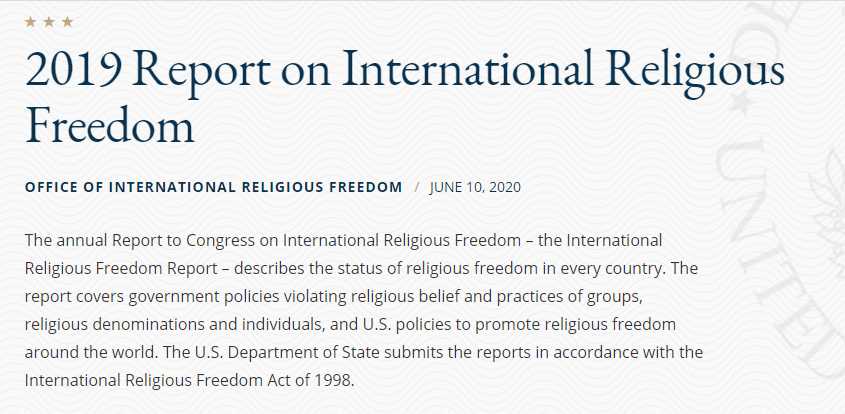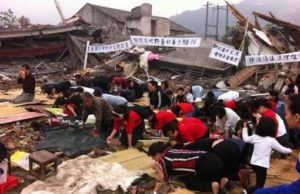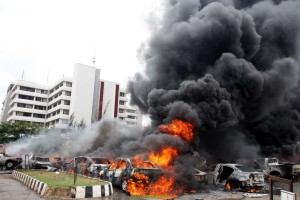 WASHINGTON — The U.S. Department of State released its annual International Religious Freedom Report on Wednesday, which analyzes the state of religious freedom around the world, country by country.
WASHINGTON — The U.S. Department of State released its annual International Religious Freedom Report on Wednesday, which analyzes the state of religious freedom around the world, country by country.
Secretary of State Mike Pompeo and Ambassador at Large for International Religious Freedom Sam Brownback also held a press conference to speak about the report.
The two said that while they there have been “positive developments” in various countries, there is also “great darkness over parts of the world” in terms of religious persecution.
“In many places of the world, individuals have become more familiar with religious oppression than religious freedom,” Brownback said.
Pompeo and Brownback cited Nicaragua, Nigeria, China and Iran as being particularly concerning.
“The Nicaraguan government harasses and intimidates religious leaders and worshipers and desecrates religious spaces, often using proxies,” Pompeo said. “In Nigeria, ISIS and Boko Haram continue to attack Muslims and Christians alike. ISIS beheaded 10 Christians in that country just this past December.”
“And in China, state-sponsored repression against all religions continues to intensify,” he noted. “The Chinese Communist Party is now ordering religious organizations to obey CCP leadership and infuse communist dogma into their teachings and practice of their faith.”
Brownback outlined, “In Iran, 109 members of minority religious groups remain in prison for simply being religious minority practitioners. And last year, the government executed a number of individuals on charges of ‘enmity against God.'”
“In Nigeria, conflicts and carnage continue between predominantly Muslim Fulani herdsmen and predominantly Christian farmers in North Central states,” he added.
The report provides extensive information country-by-country surrounding the treatment of religious communities in 2019.

In its section on China, the report explains that “[a]uthorities in many provinces targeted religious groups with overseas ties, particularly Christian groups. The government offered financial incentives to law enforcement to arrest religious practitioners and to citizens who reported ‘illegal religious activity.'”
“The government continued a campaign of religious Sinicization to bring all religious doctrine and practice in line with CCP doctrine, adopting a formal five-year plan on January 7,” it outlines. “Officials across the country shut down religious venues, including some that were affiliated with the authorized patriotic religious associations, and placed surveillance cameras in houses of worship as a condition of allowing these venues to continue operating.”
The Iran section advises, “By law, non-Muslims may not engage in public persuasion or attempted conversion of Muslims. These activities are considered proselytizing and punishable by death.”
“Authorities may close a church and arrest its leaders if churchgoers do not register or unregistered individuals attend services,” it notes. “Individuals who convert to Christianity are not recognized as Christian under the law. They may not register and are not entitled to the same rights as recognized members of Christian communities.”
 In Nigeria, Boko Haram and ISIS-West Africa were the main persecutors, although concerns remain that the government is not doing enough to stop the violence.
In Nigeria, Boko Haram and ISIS-West Africa were the main persecutors, although concerns remain that the government is not doing enough to stop the violence.
“In September, ISIS-WA released a video depicting the beheading of two Christian aid workers; in the video, one of the killers vowed to kill every Christian the group captured in ‘revenge’ for Muslims killed in past conflicts,” the report cites.
“On April 14, Muslim Fulani herdsmen killed 17 Christians who had gathered after a baby dedication at a Baptist church in the central part of the country, including the mother of the child.”
“So our work is clearly cut out for us,” Brownback said on Wednesday. “We must continue to build partnerships and alliances with nations who share our commitment to advance religious freedom around the world, and we must continue our efforts to stop bad actors. And we must also continue to expand our capacity. The importance of advancing religious freedom cannot be overstated.”
View the report here. Use the dropdown on the right to select the writeup for each country.
As previously reported, President Trump signed an executive order last week directing Secretary of State Mike Pompeo and United States Agency for International Development (USAID) Administrator John Barsa to develop a plan to prioritize religious freedom in U.S. foreign policy and in foreign assistance funding.
“Religious freedom, America’s first freedom, is a moral and national security imperative,” it reads. “Religious freedom for all people worldwide is a foreign policy priority of the United States, and the United States will respect and vigorously promote this freedom.”
1 Timothy 2:5 says, “For there is one God and one mediator between God and men, the man Christ Jesus.”
2 Timothy 3:12 advises, “Yea, and all that will live godly in Christ Jesus shall suffer persecution.”
Become a Christian News Network Supporter...


